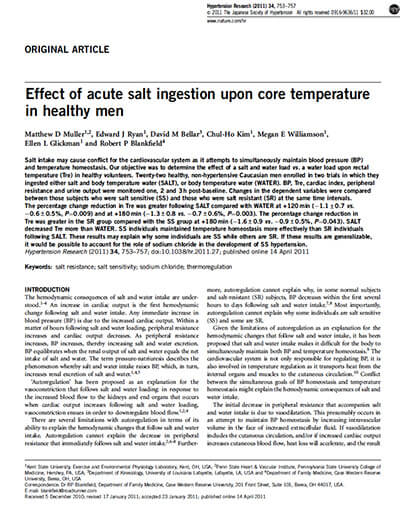Abstract
Salt intake may cause conflict for the cardiovascular system as it attempts to simultaneously maintain blood pressure (BP) and temperature homeostasis. Our objective was to determine the effect of a salt and water load vs. a water load upon rectal temperature (Tre) in healthy volunteers. Twenty-two healthy, non-hypertensive Caucasian men enrolled in two trials in which they ingested either salt and body temperature water (SALT), or body temperature water (WATER). BP, Tre, cardiac index, peripheral resistance and urine output were monitored one, 2 and 3 h post-baseline. Changes in the dependent variables were compared between those subjects who were salt sensitive (SS) and those who were salt resistant (SR) at the same time intervals. The percentage change reduction in Tre was greater following SALT compared with WATER at +120 min (−1.1±0.7 vs. −0.6±0.5%, P=0.009) and at +180 min (−1.3±0.8 vs. −0.7±0.6%, P=0.003). The percentage change reduction in Tre was greater in the SR group compared with the SS group at +180 min (−1.6±0.9 vs. −0.9±0.5%, P=0.043). SALT decreased Tre more than WATER. SS individuals maintained temperature homeostasis more effectively than SR individuals following SALT. These results may explain why some individuals are SS while others are SR. If these results are generalizable, it would be possible to account for the role of sodium chloride in the development of SS hypertension.
Available for Download
This white paper is available to the public via download via the following formats:


